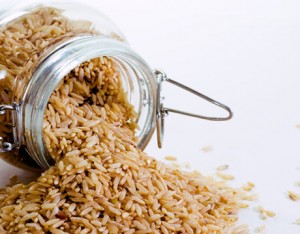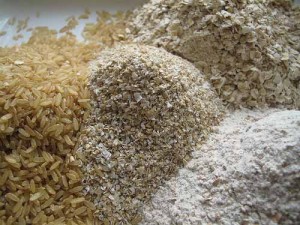 By Scarlett Blandon, MS RDN. Unless you were a vegan (or a yogi…or maybe a protein powder junky) the chances of you knowing about brown rice protein are slim to none. Rice protein is a novel source of protein derived from the entire rice grain (including bran layer), and is available as
By Scarlett Blandon, MS RDN. Unless you were a vegan (or a yogi…or maybe a protein powder junky) the chances of you knowing about brown rice protein are slim to none. Rice protein is a novel source of protein derived from the entire rice grain (including bran layer), and is available as  a concentrate or isolate just like other protein powders. It offers several benefits that other protein powders do not, but chances are those merits have been drowned out by: (1) the negative stereotypes surrounding rice protein’s plant-based origin; (2) the popularity and media-hype of whey protein. Sure, rice protein might not have all the looks and attractive qualities that whey does, but it’s those unique differences that make it an outstanding alternate protein source for athletes and sports enthusiasts alike. Here are a few reasons why you might consider brown rice protein:
a concentrate or isolate just like other protein powders. It offers several benefits that other protein powders do not, but chances are those merits have been drowned out by: (1) the negative stereotypes surrounding rice protein’s plant-based origin; (2) the popularity and media-hype of whey protein. Sure, rice protein might not have all the looks and attractive qualities that whey does, but it’s those unique differences that make it an outstanding alternate protein source for athletes and sports enthusiasts alike. Here are a few reasons why you might consider brown rice protein:
Easy on the stomach—and the immune system.
Dairy- and soy-derived protein supplements might be wonderful for X number of reasons, but unfortunately, not everyone can digest these proteins, and some might even be highly allergic to them. The Food Allergy Research & Education organization states that about 15 million Americans have food allergies and this number appears to be on the rise1. Milk and soy happen to be two of eight foods accounting for 90% of all food allergies1. Aside from dairy allergies, 30-50 million Americans are lactose intolerant2. And despite lactose-free claims on dairy-derived protein supplements, many still anecdotally experience GI distress which can negatively interfere with training or performance (or number of friends  ).
).
Gluten is another, increasingly common immune-system offender. Some commercial protein supplements may contain ingredients derived from or made with gluten. This can be detrimental to the 3  million Americans diagnosed with Celiac disease and many more who remain undiagnosed3. What’s worse is that damage to the microvilli from gluten can actually cause a person to develop lactose-intolerance, rendering them doubly restricted from those food groups4.
million Americans diagnosed with Celiac disease and many more who remain undiagnosed3. What’s worse is that damage to the microvilli from gluten can actually cause a person to develop lactose-intolerance, rendering them doubly restricted from those food groups4.
 On the other hand, brown rice protein is derived from rice, a well-known hypoallergenic food source. As a staple food in many cultures (for thousands of years!), rice is highly unlikely to elicit an allergic reaction (or intolerance) and is not surprisingly recommended as a first food for babies. As such, rice protein is expectedly gentle on the GI tract and may offer greater benefit to those athletes or exercise enthusiasts with food allergies, intolerances or sensitivities.
On the other hand, brown rice protein is derived from rice, a well-known hypoallergenic food source. As a staple food in many cultures (for thousands of years!), rice is highly unlikely to elicit an allergic reaction (or intolerance) and is not surprisingly recommended as a first food for babies. As such, rice protein is expectedly gentle on the GI tract and may offer greater benefit to those athletes or exercise enthusiasts with food allergies, intolerances or sensitivities.
Aids in recovery and builds muscle, much like whey.
Up until recently, nothing was truly known about the ability of rice protein as a sports nutrition supplement. Despite this, rice protein withheld much criticism from the athletic and scientific community given previous literature on the generally inferior quality of plant-based proteins and other data showing that low doses of plant-based proteins (mainly soy- and wheat-derived) do not increase muscle protein synthesis compared to animal-based proteins5,6.
Yes, rice and thus rice protein is limited in lysine and apparently less digestible than dairy proteins. But do these apparent “weaknesses” in rice protein make it unsuitable for sports nutrition? One study to date, says no.
The study, published in Nutrition Journal in June 2013, found that 24 collegiate athletes were able to obtain significant gains in muscle, power and strength whether they were taking a 48g rice protein or whey protein supplement following resistance training for 8 weeks7. They also experienced similar increases in acute recovery. Despite differences in amino acid profile, digestibility and digestion rate of the proteins, there were no statistical differences between groups. The authors assert that protein type or composition is of less significance, when key nutrients are adequately provided. In this case, one key nutrient: leucine. The leucine levels provided by the brown rice protein supplement appeared to be within or above the 2-3g threshold needed to maximize muscle protein synthesis8-11.
Although more research is needed in this arena for rice protein, these results indicate that at 48g, rice protein can serve as a substitute for whey protein for building muscle and strength. This would be especially beneficial for those athletes who follow a vegan/vegetarian lifestyle, are unable to digest dairy-based proteins and/or are looking for an alternate protein source.
Suits vegan or other plant-based lifestyles.
Almost 16 million people consider themselves vegetarian and another 6 million consider themselves vegan in the US alone according to one 2012 survey12. Motives behind these plant-based lifestyles might include views on animal welfare, religious and cultural beliefs and/or environmental concerns. However, 47% of vegans indicate that their major reason for following this diet is actually health, followed by animal welfare (40%)13. While exercise is a health-related activity, it is not unreasonable to consider the inclusion of some athletes or sports enthusiasts in this population.
Although vegans & vegetarians are able to consume all essential nutrients from plant-based foods alone, it can be a challenge for athletes when certain nutrients like protein are needed in higher quantities. Supplements like rice protein offer a convenient and concentrated source of protein to help meet their needs. Unlike soy, rice protein does not contain phytoestrogens which can potentially interfere with hormones.
Rice protein is also an excellent option for those trending on natural or other plant-based lifestyles. Unlike many dairy- or soy-based protein supplements, rice proteins are predominantly processed using only water and natural enzymes rather than toxic solvents like hexane. Certain rice proteins may also offer value over other protein sources since it is not from a genetically modified source, does not come from an animal known to be treated with growth hormones (rbST/bGH), anabolic steroids (AAS), estrogens and other hormones, antibiotics or other chemicals known to, suspected of, to affect or have an impact upon human health.
Whether you are looking to rotate your protein source, give your stomach a break, trend on a novel and natural product all while building muscle and gaining strength, rice protein might be the choice for you.
About the Author: Scarlett Blandon is the in-house nutrition scientist for Axiom Foods, the worlds’ leading manufacturer of hexane-free rice protein among other plant proteins, and for Growing Naturals, a consumer brand specializing in hypoallergenic plant proteins and natural lifestyle products. At Axiom and GN she oversees all research-related ventures and nutrition communications. Having worked closely with renowned researchers in the past, she is dedicated to expanding the literature on rice- and other plant proteins while cultivating the knowledge of consumers and manufacturers alike.
hexane-free rice protein among other plant proteins, and for Growing Naturals, a consumer brand specializing in hypoallergenic plant proteins and natural lifestyle products. At Axiom and GN she oversees all research-related ventures and nutrition communications. Having worked closely with renowned researchers in the past, she is dedicated to expanding the literature on rice- and other plant proteins while cultivating the knowledge of consumers and manufacturers alike.
REFERENCES
- Facts and statistics. Food Allergy Research and Education. Available at: http://www.foodallergy.org/facts-and-stats
- Lactose intolerance. Wexner Medical Center, Ohio State University. Available at: http://medicalcenter.osu.edu/patientcare/healthcare_services/digestive_disorders/lactose_intolerance/Pages/index.aspx
- Case S. Celiac disease, gluten sensitivity and the gluten-free diet. July 2011. Available at: http://www.nutrition411.com/component/k2/item/28313-celiac-disease-gluten-sensitivity-and-the-gluten-free-diet
- Lactose intolerance and celiac disease. Celiac Disease Foundation. Available at: http://www.celiac.org/images/stories/PDF/lactose-intolerance.pdf
- Wilkinson SB, Tarnopolsky MA, Macdonald MJ, et al. Consumption of fluid skim milk promotes greater muscle protein accretion after resistance exercise than does consumption of an isonitrogenous and isoenergetic soy-protein beverage. Am J Clin Nutr. 2007; 85: 1031-1040.
- Norton LE, Layman DK, Bunpo P, et al. The leucine content of a complete meal directs peak activation but not duration of skeletal muscle protein synthesis and mammalian target of rapamycin signaling in rats. J Nutr. 2009; 139: 1103-1109.
- Joy J, Lowery RP, Wilson JM, et al. The effects of 8 weeks of whey or rice protein supplementation on body composition and exercise performance. Nutrition J. 2013; 12:86
- Norton LE, Layman DK. Leucine Regulates Translation Initiation of Protein Synthesis in Skeletal Muscle after Exercise. J Nutr. 2006; 136(2): 533S-537S.
- Norton L, Wilson GJ. Optimal protein intake to maximize muscle protein synthesis. Agro Food industry hi-tech. 2009; 20: 54-57.
- Paddon-Jones D, Sheffield-Moore M, Zhang XJ, et al. Amino acid ingestion improves muscle protein synthesis in the young and elderly. Am J Physiol Endocrinol Metab. 2004; 286: E321-E328.
- Tipton KD, Ferrando AA, Phillips SM, et al. Postexercise net protein synthesis in human muscle from orally administered amino acids. Am J Physiol. 1999; 276: E628-E634.
- Newport F. In the US, 5% consider themselves vegetarian. Gallup Wellbeing. 2012. Available at: http://www.gallup.com/poll/156215/consider-themselves-vegetarians.aspx



